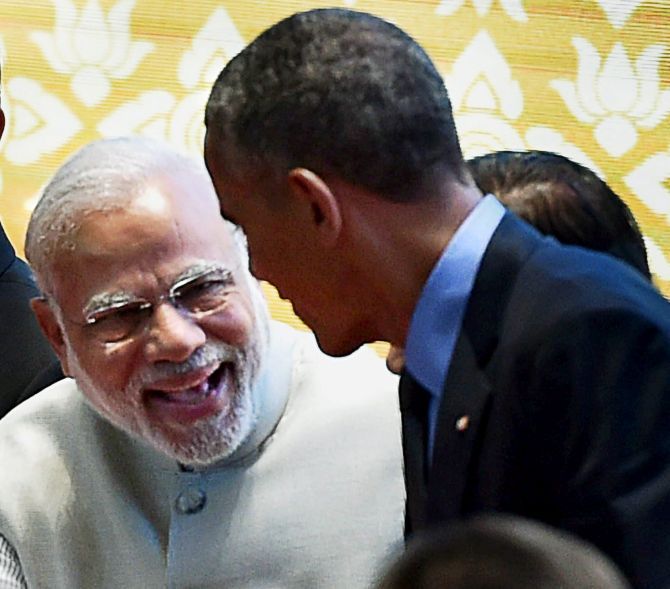'Platinum grade support from Washington has not been forthcoming, the christening of the US-Indian ties as a 'defining partnership' notwithstanding,' says A,bassador M K Bhadrakumar.
 Career diplomats call it 'localitis' -- the propensity of envoys to play to the gallery in countries of their accreditation when called upon to take open stance on issues of extremely high sensitivity where convergence with the host country is lacking.
Career diplomats call it 'localitis' -- the propensity of envoys to play to the gallery in countries of their accreditation when called upon to take open stance on issues of extremely high sensitivity where convergence with the host country is lacking.
It all finally boils down to word craft.
The fascinating interview given by the American ambassador to India Richard Verma to The Hindu newspaper is to the point, where he was called upon to take a stance on the cascading India-Pakistan tensions and our 'strategic strikes'.
Platinum grade support from Washington has not been forthcoming, the christening of the US-Indian ties as a 'defining partnership' notwithstanding.
Washington cannot be faulted insofar as India-Pakistan tensions impact its vital interests. However, the contradiction apparently embarrasses us.
Why it should be so remains a mystery.
After all, no two countries need to see eye to eye on all major issues affecting them.
Probably, the Indians take America far too emotionally as second home. Or, it could be a matter of self-confidence.
At any rate, Ambassador Verma brilliantly danced around his interviewer, bearing in mind what his audience expected to hear but what he simply cannot say -- and yet he somehow must.
So he spoke in generics and selectively. He knew it'd delight the Indian heart to hear US-Pakistan ties are in the pits, therefore, he dipped into the dark period of Abbottabad strike (to kill bin Laden).
Remember, how Pakistan had closed the transit routes for NATO convoys for almost an year, forcing the West, most reluctantly, to knock on Moscow's doors to allow a northern route via Central Asia? Indeed, that was a genuinely difficult period in US-Pakistan alliance.
However, the stunning fact is that Pakistan just recently put together a few quiet sessions for the US to interact with senior Taliban functionaries through the month of September (when the Uri attack, 'surgical strikes', et al, were keeping us busy).
You don't have to be cerebral to make out that things can't be so bad between Washington and Rawalpindi when the latter lends a big hand to ensure Afghanistan doesn't spoil Hillary Clinton's election bid.
Of course, we are free to interpret Ambassador Verma's words. But then, he knows that the Obama administration has to walk a fine line between Delhi and Islamabad.
To be sure, he knows White House thinking. Back there, even as his Hindu interview appeared, President Obama's spokesman Josh Ernest gave the authoritative version on how Pakistan appears through the looking glass.
Ernest neatly sidestepped Prime Minister Narendra Modi's famous 'mothership' remark in Goa, and said:
'What I can say in general is that the United States has been able to work effectively with Pakistan to confront extremist threats that threaten the interests of both our countries.'
'At the same time, we've acknowledged on a number of occasions that there is more that we would like to see Pakistan do to confront that threat, in part because the Pakistani people face a unique threat from those extremists. And there are many times when I've stood at this podium being asked to respond to the attacks from extremists that were carried out inside of Pakistan that resulted in the death or injury of many Pakistani citizens.'
'So there is a built-in interest for Pakistan to confront this extremist threat that they face. And there are a variety of ways in which the United States supports them in those efforts. But, of course, there is more that we believe that they can and should do, and we'll continue to have those conversations with them.
Why should we make life more complicated than it already is for Ambassador Richard Verma (or Russian Ambassador Alexander Kadakin)?
The bottom line is, our narrative lacks credibility.
Why it is so needs honest analysis. Some beginning seems to be happening, if one were to go by today's editorial in the Hindustan Times entitled 'Few share India's views on terror: Aung San Suu Kyi is the latest leader to give a thumbs down to isolating Pakistan.'











 © 2025
© 2025